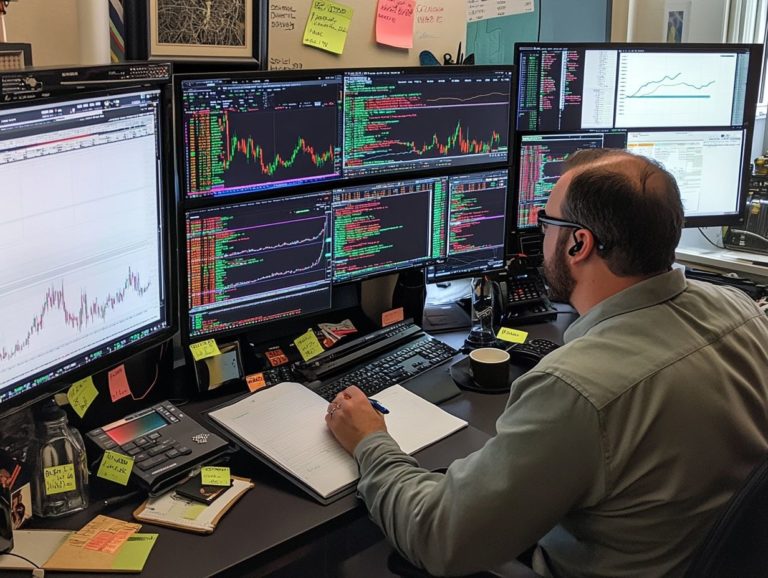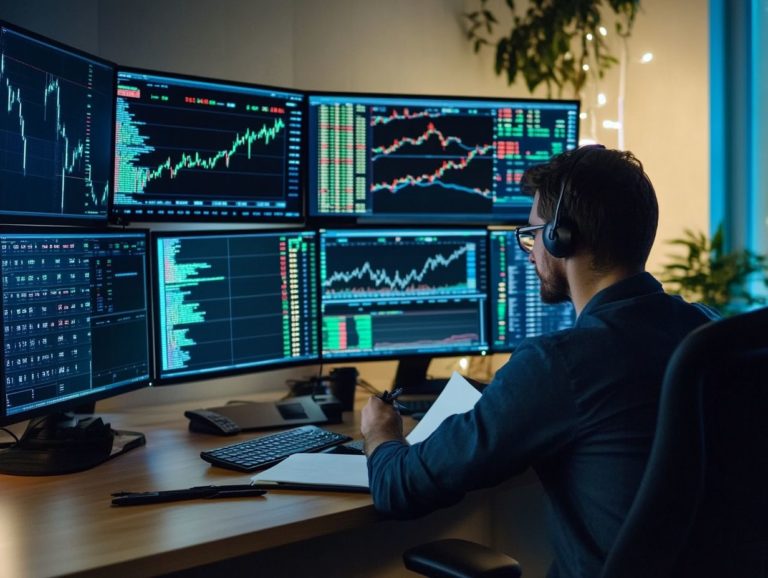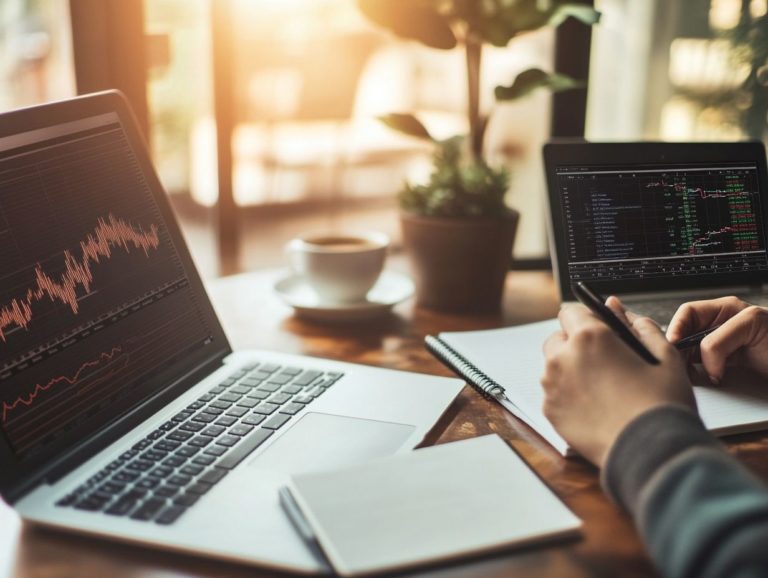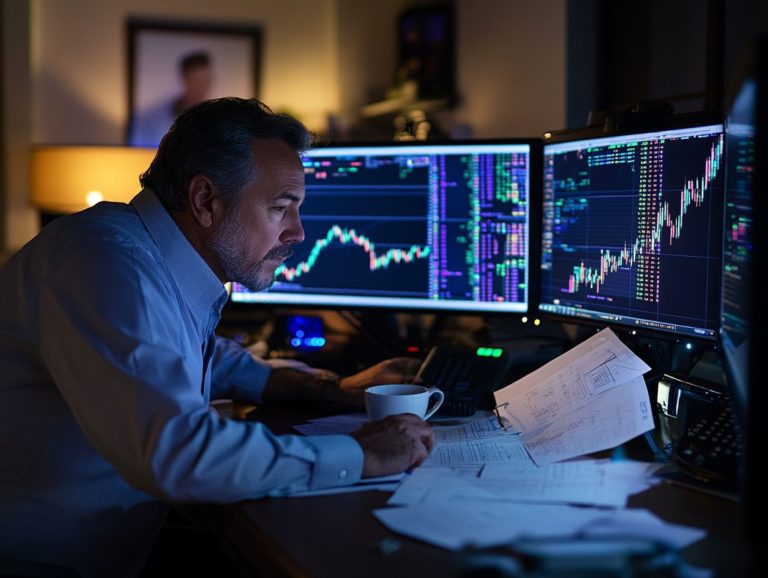Exploring the Connection Between Trading and Addiction
Trading can be an exhilarating pursuit, fueled by the thrill of the market and the enticing prospect of financial gain. Yet, this excitement can sometimes blur the lines into addiction, leading to potentially harmful consequences.
Get ready to explore the thrilling connection between trading and addiction! You ll discover how addiction can impair your decision-making and risk management abilities, recognize the signs of trading addiction, and explore strategies to cultivate healthier trading habits.
Join us as you navigate this complex landscape, empowering yourself to trade responsibly and with confidence.
Contents
- Key Takeaways:
- The Relationship Between Trading and Addiction
- Similarities between Trading and Addiction
- The Impact of Addiction on Trading
- Recognizing and Addressing Trading Addiction
- Preventing Trading Addiction
- Frequently Asked Questions
- What is the connection between trading and addiction?
- How does trading behavior resemble addiction?
- What are the possible underlying causes of trading addiction?
- Can trading addiction have negative financial consequences?
- Is there treatment available for trading addiction?
- How Can I Prevent Trading Addiction?
Key Takeaways:
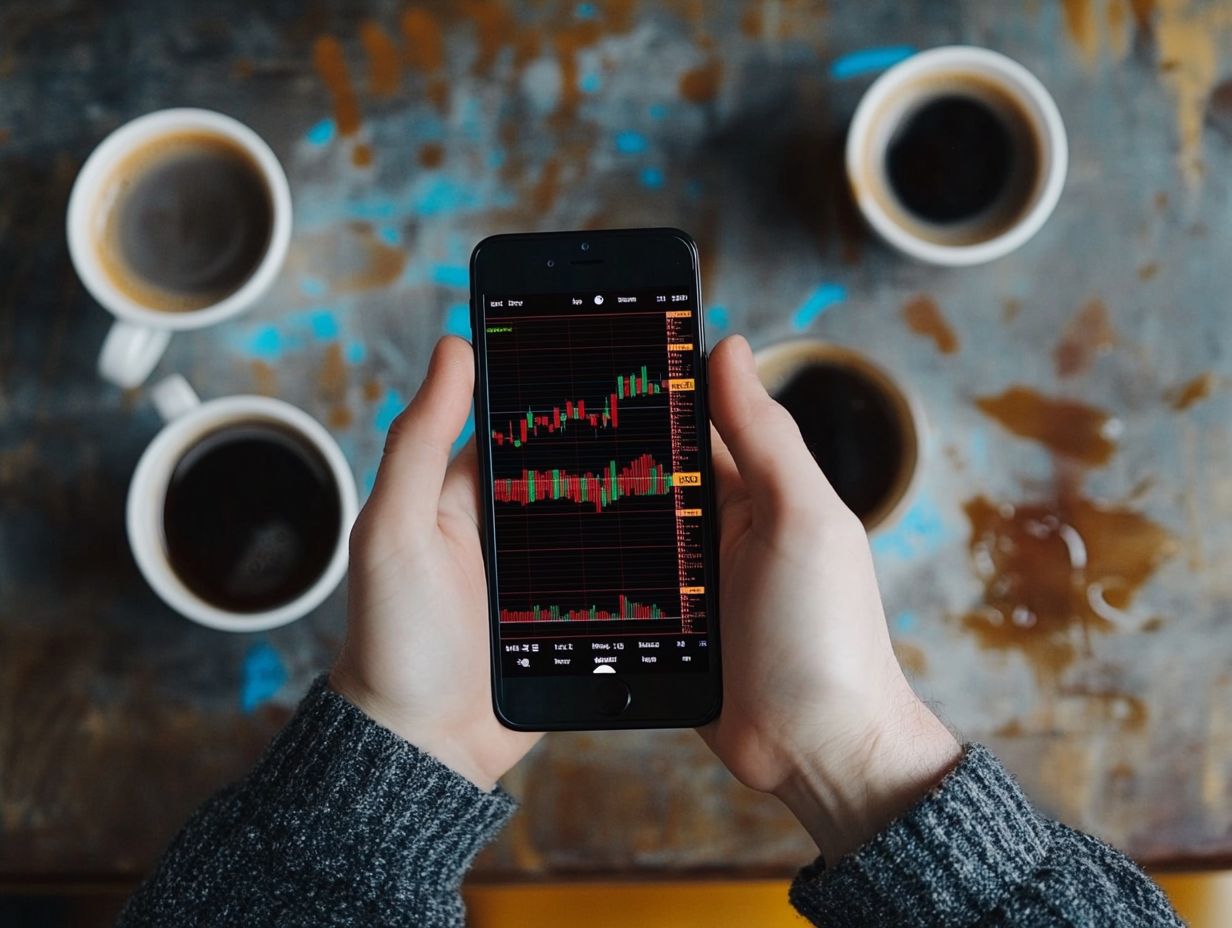
- Trading can lead to addiction, with similar behavioral patterns and triggers. Recognizing these signs can help you take action before it s too late.
- Addiction can have a detrimental impact on trading, affecting decision making and risk management.
- It is important for traders to recognize the signs and symptoms of addiction and seek help and support to prevent and address trading addiction.
The Relationship Between Trading and Addiction
The connection between mental health and trading deserves your attention, as both pursuits reveal striking similarities in the ways our mind works and societal impacts.
With the surge in high-frequency trading and online platforms, you may find yourself increasingly vulnerable to trading addiction, which closely mirrors the compulsive behaviors typical of gambling disorders.
The symptoms often appear as emotional highs followed by devastating financial losses, creating a downward spiral that complicates your personal relationships and may lead to neglectful behaviors.
Understanding this connection is essential for anyone navigating the financial markets and striving for true financial freedom.
Defining Trading and Addiction
Trading involves the act of buying and selling financial instruments across various markets. On the other hand, addiction manifests as a compulsive pursuit of activities that offer immediate gratification, often at the expense of long-term well-being.
In the financial arena, you might explore different trading styles, such as day trading, which focuses on frequent transactions to seize short-term price fluctuations. Conversely, investing leans towards a long-term strategy, where you hold onto assets with the intention of enjoying gradual growth over time.
However, the allure of potential profits can sometimes lead to behavioral addiction. This psychological condition occurs when the excitement of trading stimulates the brain’s reward system that makes us feel pleasure, creating a compelling urge to engage further.
You may notice symptoms like compulsive trading despite ongoing losses, heightened anxiety when you’re not in the market, and a tendency to neglect personal responsibilities. Over time, this can culminate in significant emotional turmoil and financial strain.
Similarities between Trading and Addiction
Both trading and addiction share intriguing psychological dynamics, centered on the thrill and emotional highs linked to risk-taking and reward systems. This commonality can easily draw individuals into psychological traps, making it essential to explore the relationship between trading and emotions, which can lead to compulsive trading behaviors.
You may notice trading patterns characterized by increased frequency and impulsive decisions that closely resemble the symptoms of addiction.
Start today by assessing your trading habits and seeking support if needed. Your financial health depends on it!
Behavioral Patterns and Triggers
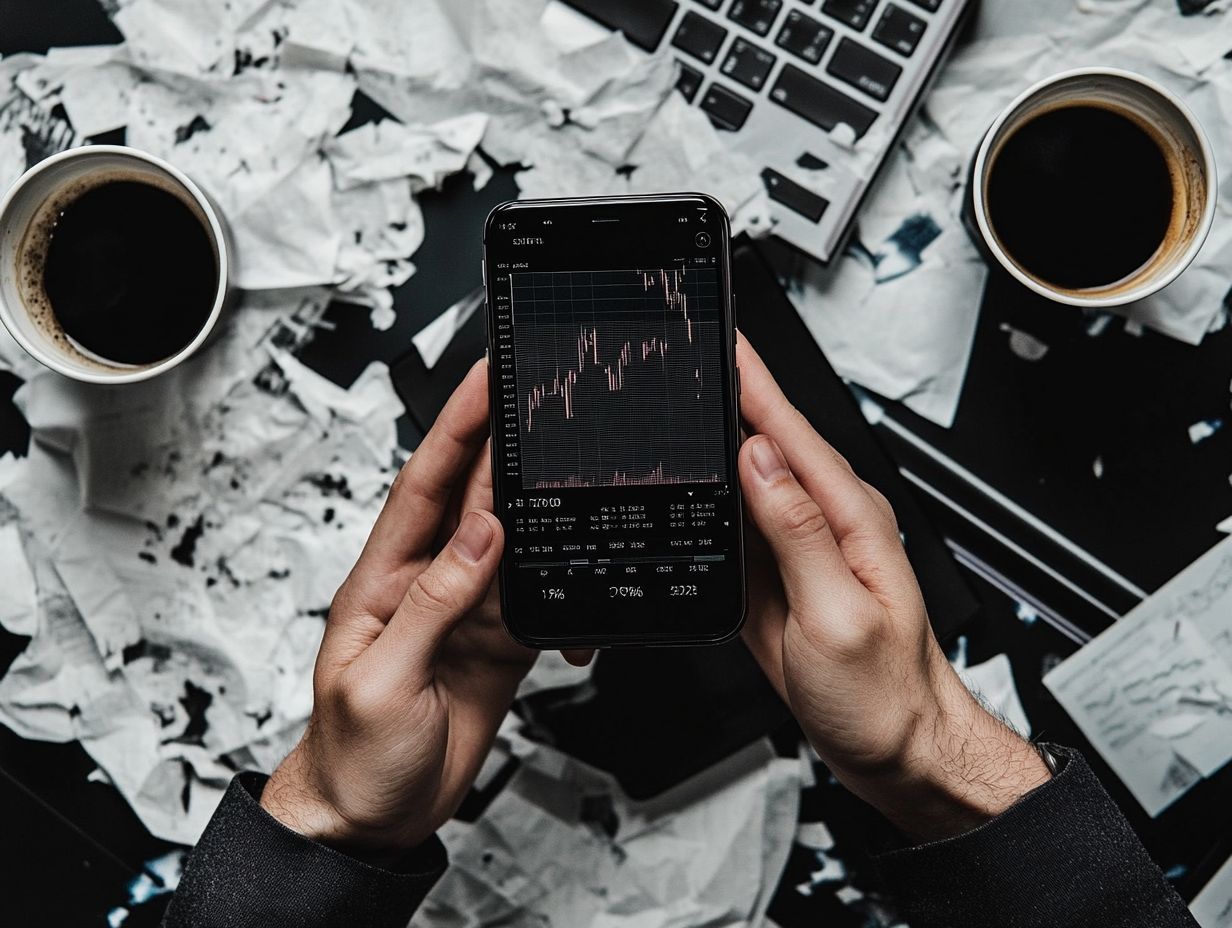
Behavioral patterns and triggers play a crucial role in trading and addiction. They often shape your responses to market fluctuations and emotional stimuli.
Understanding these dynamics provides valuable insights into why some traders engage in compulsive behaviors, similar to those seen in various addictive scenarios.
Consider the exhilaration of a sudden market surge; it can lead to a euphoric response, driving you to chase risky trades for quick gains.
Similarly, the fear of missing out (FOMO) can push you into impulsive decisions, ignoring your carefully laid strategies.
These emotional responses can blur the lines between thought-out risks and reckless behavior, creating an environment where addiction symptoms may surface, ultimately threatening your financial stability and mental well-being.
The Impact of Addiction on Trading
The impact of addiction on trading is significant. It often leads to substantial financial losses and poor decision-making abilities, undermining effective risk management.
As you navigate the complexities of trading addiction, you may find yourself in a cycle of emotional highs and lows, which can result in impulsive trades that veer away from established trading strategies.
Effects on Decision Making and Risk Management
Addiction can severely impair your decision-making processes and risk management strategies. It often drives you toward high-risk behaviors that may threaten your financial independence.
Compulsive behaviors can cloud your judgment, making you overlook critical market signals and dismiss solid strategies in favor of impulsive trades driven by emotional highs. Consequently, you may face significant losses as addiction impacts your ability to assess risks accurately.
Effective trading approaches may falter, underscoring the need for strong financial literacy and self-awareness. Developing a deep understanding of market dynamics and maintaining emotional control are key for anyone aiming to trade successfully without succumbing to addiction’s damaging effects.
Recognizing and Addressing Trading Addiction
Spotting and tackling trading addiction is vital to reclaiming your financial freedom! Many traders overlook symptoms indicating deeper psychological issues.
By recognizing these signs, you take the first step toward seeking help and obtaining professional treatment or trading support that can provide essential financial resources.
Signs and Symptoms
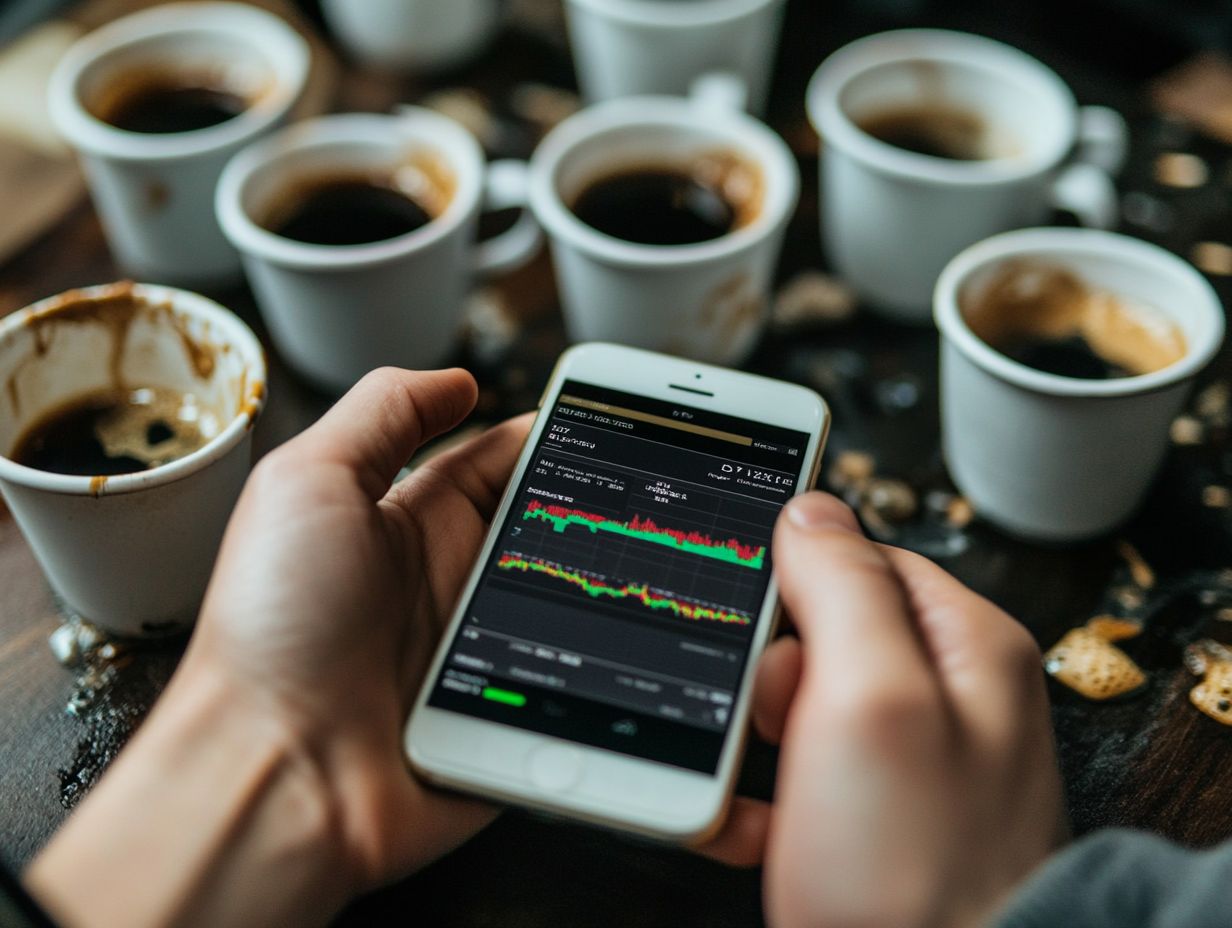
The signs and symptoms of trading addiction can manifest through various behaviors, such as compulsive trading, increased trading frequency, and emotional highs that overshadow rational decision-making.
You need to watch for signs of neglecting relationships with family and friends as your focus becomes entirely consumed by the market. This obsession can significantly affect your personal well-being, causing you to miss meaningful social interactions and the emotional support from those connections.
Compulsive behaviors can escalate, leading to impulsive decisions driven by the urgent need to chase losses or amplify gains, which can strain your finances. Over time, these indicators not only contribute to declining mental health but also jeopardize your financial stability, creating a vicious cycle with severe repercussions in both your personal and financial life.
Seeking Help and Support
Seeking help and support is an essential step for anyone grappling with trading addiction. Engaging with professional treatment options and trading support networks can significantly enhance your recovery journey and provide vital financial resources.
As you navigate the complexities of trading addiction, you’ll discover numerous avenues for assistance, from confidential hotlines to in-depth professional treatment programs. These resources are designed to cater to individuals at various stages of recovery, ensuring you can find the support that suits your unique needs.
Support groups, such as those organized by the National Council on Problem Gambling, foster a sense of community where you can share your experiences and coping strategies with others. These organizations offer invaluable resources that educate you on addictive behaviors related to trading, helping you recognize the signs of a problem and enabling you to take proactive steps toward healing.
Preventing Trading Addiction
Preventing trading addiction demands a proactive stance rooted in the development of healthy habits, robust trading strategies, and a keen understanding of financial literacy defined as the ability to understand and manage financial resources effectively. These elements are essential for effective risk assessment.
By embracing these practices, you can significantly reduce your vulnerability to addiction and exert greater control over your trading behaviors.
Healthy Habits and Strategies
Adopting healthy habits and effective trading strategies is essential for maintaining your financial independence while managing behaviors that might lead to trading addiction.
To achieve this, you should start by setting clear trading limits. These boundaries will help curb impulsive decisions that can easily spiral out of control.
Regular self-assessment is key; it allows you to recognize emotional triggers and behavioral patterns that could indicate unhealthy trading tendencies. By routinely evaluating your actions and their outcomes, you can adjust your strategies as needed.
Continuously educating yourself about risk management and market trends will enable you to make informed decisions, ultimately fostering a disciplined approach to trading. Engaging with trading communities or seeking mentorship can provide invaluable insights and support, reinforcing a balanced and sustainable trading practice.
Frequently Asked Questions
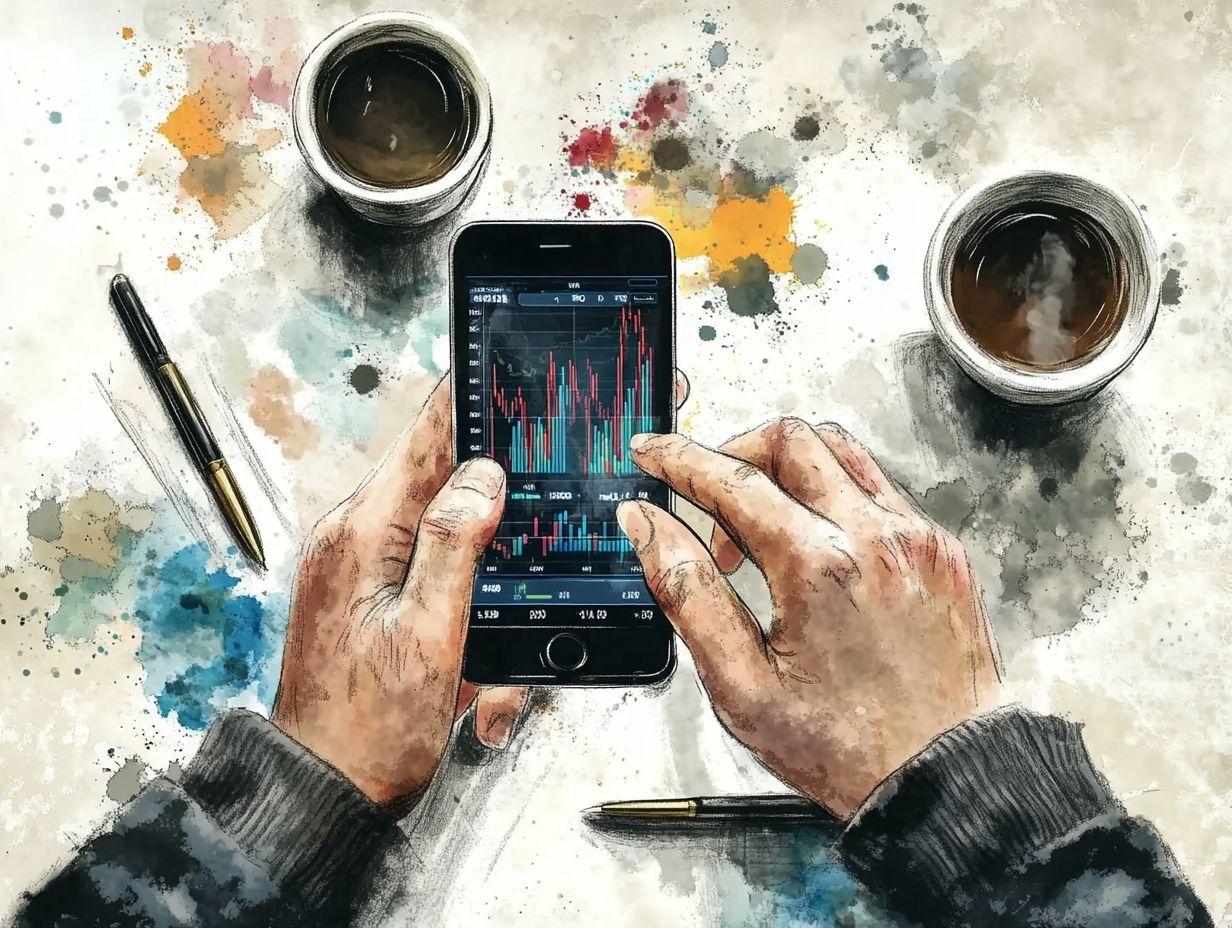
What is the connection between trading and addiction?
The connection between trading and addiction lies in the behavioral and psychological patterns seen in individuals who engage in trading. Like other types of addiction, trading can become a compulsive behavior that is difficult to control and can have negative consequences, highlighting the connection between trading and emotional health.
How does trading behavior resemble addiction?
Traders may experience a rush of excitement or euphoria when making successful trades, similar to the highs experienced by individuals with substance addictions. They may also engage in excessive risk-taking and have difficulty stopping or cutting back on their trading despite negative consequences.
What are the possible underlying causes of trading addiction?
Several factors may contribute to trading addiction, such as predisposition towards addictive behaviors, underlying psychological or emotional issues, or a need for constant stimulation and reward. Environmental factors, such as high-pressure work environments, may also play a role.
Can trading addiction have negative financial consequences?
Yes, trading addiction can have serious financial consequences. As with any addiction, individuals may engage in risky and impulsive behaviors that can lead to financial loss. They may also neglect other important responsibilities and obligations in order to focus on trading.
Is there treatment available for trading addiction?
Yes, treatment is available for trading addiction. This may involve therapy, support groups, and education on healthy trading habits. Don t wait seek help today if you feel your trading is becoming uncontrollable or causing negative effects in your life.
Start your journey to recovery now!
How Can I Prevent Trading Addiction?
To keep trading fun and safe, set clear limits on your trading activities. Ask friends and family for support and find other ways to relieve stress.
Be aware of warning signs. If you notice them, don t hesitate to seek help!
Don’t let trading take over your life! Stay alert and act quickly if you notice the signs.



